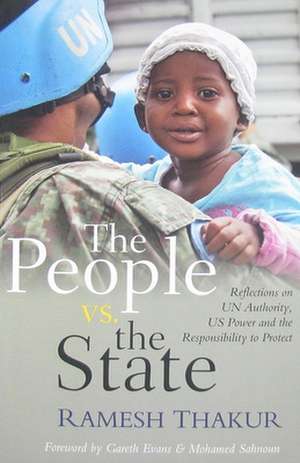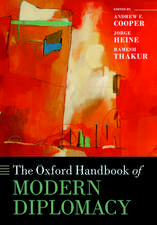The People vs. the State: Reflections on UN Authority, U.S. Power and the Responsibility to Protect
Autor Ramesh Thakuren Limba Engleză Paperback – 4 oct 2011
Professor Ramesh Thakur, former senior vice-rector of the United Nations University and UN assistant secretarygeneral, is sometimes described as one of the intellectual godfathers of the Responsibility to Protect (R2P). Based in our common humanity, R2P is the acceptance of a duty of care by those living in safety to those trapped in zones of danger. It aims to convert a shocked international conscience into timely and decisive collective action to rescue vulnerable communities so that groups condemned to die in fear can live in hope instead. For more than a decade, Thakur has been deeply engaged with the international discourse on R2P as an influential member of the international commission that came up with this innovative principle. This book brings together his opinion articles from several newspapers in Australia, Canada, India, and Japan, and the International Herald Tribune. It begins with Kosovo in 1999 and ends with Libya in 2011, with stops at way stations in Iraq, Darfur, Lebanon, Myanmar, Zimbabwe, Sri Lanka, Kenya, and Egypt.
Thakur argues that our choice in today's real world, with a universal human rights norm and an internationalized human conscience, is not whether international interventions will take place but where, when, how, and under whose authority. Given the nature and victims of modern armed conflict, protection of civilians and populations at risk of mass atrocities is a core international imperative. Progress toward the good international society requires that force be harnessed to UN authority as the Responsibility to Protect moves from a universally validated principle to a routinely actionable norm.
Thakur argues that our choice in today's real world, with a universal human rights norm and an internationalized human conscience, is not whether international interventions will take place but where, when, how, and under whose authority. Given the nature and victims of modern armed conflict, protection of civilians and populations at risk of mass atrocities is a core international imperative. Progress toward the good international society requires that force be harnessed to UN authority as the Responsibility to Protect moves from a universally validated principle to a routinely actionable norm.
Preț: 163.95 lei
Nou
Puncte Express: 246
Preț estimativ în valută:
31.37€ • 32.85$ • 26.02£
31.37€ • 32.85$ • 26.02£
Carte tipărită la comandă
Livrare economică 09-23 aprilie
Preluare comenzi: 021 569.72.76
Specificații
ISBN-13: 9789280812077
ISBN-10: 9280812076
Pagini: 260
Dimensiuni: 152 x 229 x 15 mm
Greutate: 0.39 kg
Ediția:New.
Editura: Brookings Institution Press
Colecția United Nations University Press
ISBN-10: 9280812076
Pagini: 260
Dimensiuni: 152 x 229 x 15 mm
Greutate: 0.39 kg
Ediția:New.
Editura: Brookings Institution Press
Colecția United Nations University Press
Notă biografică
Ramesh Thakur is professor of international relations in the Asia-Pacific College of Diplomacy, Australian National University.
Descriere
Professor Ramesh Thakur, former senior vice-rector of the United Nations University and UN assistant secretarygeneral, is sometimes described as one of the intellectual godfathers of the Responsibility to Protect (R2P). Based in our common humanity, R2P is the acceptance of a duty of care by those living in safety to those trapped in zones of danger. It aims to convert a shocked international conscience into timely and decisive collective action to rescue vulnerable communities so that groups condemned to die in fear can live in hope instead. For more than a decade, Thakur has been deeply engaged with the international discourse on R2P as an influential member of the international commission that came up with this innovative principle. This book brings together his opinion articles from several newspapers in Australia, Canada, India, and Japan, and the International Herald Tribune. It begins with Kosovo in 1999 and ends with Libya in 2011, with stops at way stations in Iraq, Darfur, Lebanon, Myanmar, Zimbabwe, Sri Lanka, Kenya, and Egypt.
Thakur argues that our choice in today's real world, with a universal human rights norm and an internationalized human conscience, is not whether international interventions will take place but where, when, how, and under whose authority. Given the nature and victims of modern armed conflict, protection of civilians and populations at risk of mass atrocities is a core international imperative. Progress toward the good international society requires that force be harnessed to UN authority as the Responsibility to Protect moves from a universally validated principle to a routinely actionable norm.
Thakur argues that our choice in today's real world, with a universal human rights norm and an internationalized human conscience, is not whether international interventions will take place but where, when, how, and under whose authority. Given the nature and victims of modern armed conflict, protection of civilians and populations at risk of mass atrocities is a core international imperative. Progress toward the good international society requires that force be harnessed to UN authority as the Responsibility to Protect moves from a universally validated principle to a routinely actionable norm.
















